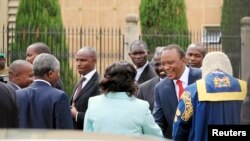THE HAGUE —
The International Criminal Court set a new date for the opening of Kenyan President Uhuru Kenyatta's trial on Monday, saying the Oct. 7 start would give the Kenyan government more time to provide evidence in the case.
Prosecutors allege their witnesses against Kenyatta and his deputy William Ruto, on trial on similar charges, have been bribed or threatened into withdrawing their testimony.
They say Kenyatta's government has not done all it can to turn over incriminating evidence against him and want access to his phone and banking records, which they believe could shore up a case weakened by the loss of that testimony.
Prosecutors accuse Kenyatta of orchestrating the wave of deadly violence that swept Kenya after the country's 2007 elections, claiming 1,200 lives, but their case has been weakened by the loss of several key witnesses.
"The purpose of the adjournment is to provide the government of Kenya with a further, time-limited opportunity to provide certain records, which the prosecution had previously requested," the court said in a statement.
The Kenyatta case has driven a wedge between the court's backers in Europe and Africa, where many accuse the 11-year-old institution of singling out Africans for prosecution.
Many western countries are torn between the desire to support the court and their desire to keep East Africa's economic powerhouse on the side of the struggle against Islamic militancy in neighboring Somalia.
Kenyatta, elected president last year after a campaign in which the ICC charges he faced played a central role, has cooperated with the court even as he has led a diplomatic push to have the case against him postponed or dropped entirely.
Prosecutors allege their witnesses against Kenyatta and his deputy William Ruto, on trial on similar charges, have been bribed or threatened into withdrawing their testimony.
They say Kenyatta's government has not done all it can to turn over incriminating evidence against him and want access to his phone and banking records, which they believe could shore up a case weakened by the loss of that testimony.
Prosecutors accuse Kenyatta of orchestrating the wave of deadly violence that swept Kenya after the country's 2007 elections, claiming 1,200 lives, but their case has been weakened by the loss of several key witnesses.
"The purpose of the adjournment is to provide the government of Kenya with a further, time-limited opportunity to provide certain records, which the prosecution had previously requested," the court said in a statement.
The Kenyatta case has driven a wedge between the court's backers in Europe and Africa, where many accuse the 11-year-old institution of singling out Africans for prosecution.
Many western countries are torn between the desire to support the court and their desire to keep East Africa's economic powerhouse on the side of the struggle against Islamic militancy in neighboring Somalia.
Kenyatta, elected president last year after a campaign in which the ICC charges he faced played a central role, has cooperated with the court even as he has led a diplomatic push to have the case against him postponed or dropped entirely.





